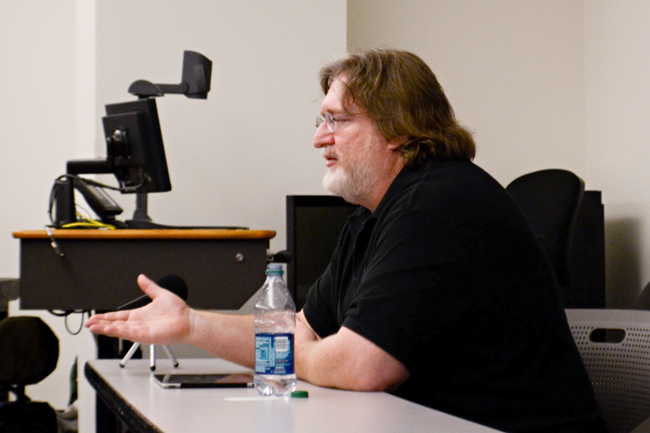Corporations are rarely known for being democratic in their structure, but at Valve Software, employees are given free reign over almost every step of their day-to-day regimens, according to Valve founder Gabe Newell.
The developer of critically acclaimed video games Half-Life 2, Team Fortress 2 and others, Valve’s gaming distribution platform Steam serves as a market place for games and virtual commodities created by users and controls 70 percent of the market for downloadable PC games, according to Forbes.
Newell, who spoke at the LBJ School of Public Affairs on Wednesday, said he thinks the quickening rise of the information industry may soon allow other companies to embrace the same flat organizational model.
“It seems fairly obvious that the Internet does a better job of organizing a bunch of individuals than General Motors or Sears does,” Newell said. “Corporations [with hierarchies] tend to be pre-internet ways of organizing production.”
As opposed to “traditional corporations,” Valve employees work not only to produce content but also to improve the productivity of their consumers, who are able to create, buy and trade virtual Steam commodities in transactions that profit the company.
“We started to see things like inflation, we started to see deflation,” Newell said of the Steam economy. “We started to see users create their own version of currency. Companies started to create regulatory structures, so in Korea you actually have to create the equivalent of a W-4 form for their characters to account for the income they gain.”
Newell said Valve’s emphasis on user-produced content creates an incentive to tailor products to individual interests, which could eventually lead to advances in tablets and phones designed for individuals.
“I can’t imagine it, we are just so used to all our cars looking the same, all our phones looking the same,” Scott Delgado, an Austinite in attendance, said. “If we can get there it would be amazing. We can make our products as unique as individuals are.”
Valve games allow users to create and trade virtual products between players. But like a real economy, this virtual market is susceptible to boom-and-bust cycles.
Valve hired Greek economist Yanis Varoufakis, who currently teaches in the LBJ School of Public Affairs, to understand this virtual economy and its implications for the future of corporate organization.
As an advisor to former Greek Prime Minister George Papandreou, Varoufakis was studying the ongoing Eurozone economic crisis when he was contacted by Valve, who foresaw similar problems in its economy and the currency problems in Greece.
Varoufakis said he thinks the two problems are similar, and that while adapting the “anarchic” models of flat organization may be difficult, it could form a new economic model in the changing information technology industry.
“New companies, especially Internet-based ones that rely a great deal on creativity and human capital, would benefit enormously from [Valve’s model],” Varoufakis said. “Quite soon we are going to inhabit a future where there will be an interest contest between traditional corporations and corporations like Valve.”
Printed on Thursday, January 31, 2013 as: Valve founder recommends wide use of digital model





















